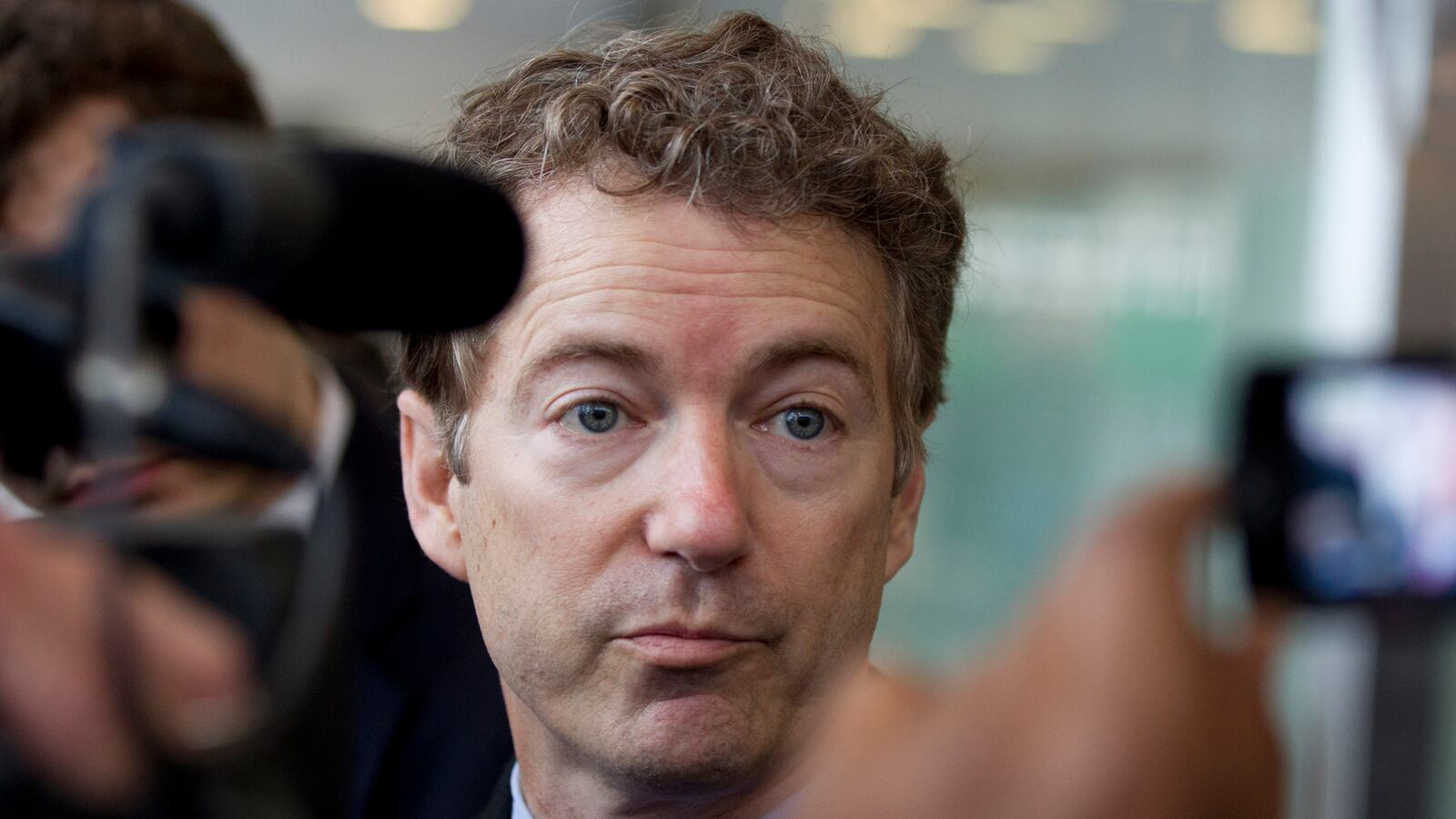The world, it seems, has gotten in the way of Senator Rand Paul’s worldview.
Paul is slated to deliver a “big speech” on foreign policy in mid-October at the National Defense University. Unusually for the media-hungry Kentucky Republican, however, the address will be off-the-record and closed to the public, according to Defense News. But that won’t lessen the press corps’ interest in what he has to say.
Paul has long been a front-runner for the Republican presidential nomination, and his minimalist (he abhors the term “isolationist”) foreign policy was initially a big hit with GOP primary voters. His opposition to President Obama on the use of drone strikes, for instance, made him a folk hero not only to the libertarian wing of the GOP, but with many anti-war Democrats as well.
For a while, this approach to foreign affairs polled well. Americans were tired with the Iraq and Afghanistan wars and the broader Bush foreign policy legacy, and Paul was considered by many to be a breath of fresh air.
Yet the Kentucky Republican’s honeymoon with the electorate may already be over. A horrible concatenation of global events has reawakened Americans to the perils of a smaller American footprint in the world, a consequence of the retrenched global posture advocated by Paul. Russia’s invasion of Ukraine, the rise of ISIS and its grisly beheading of American journalists James Foley and Steven Sotloff, and the resumption of hostilities between Hamas and Israel are just three events that have made this annus horribilis one we’d like to forget. Gone are the days of President Barack Obama’s vow, proclaimed in the well of the United Nations General Assembly, that the “tide of war is receding.” Or White House Press Secretary Josh Earnest’s laughable assertion that the administration has “substantially improved…the tranquility of the global community.”
At the beginning of his administration, even as his overall job approval rating began to sink after the initial euphoria marking the inauguration of a new president, Americans’ approval of Obama’s foreign policy rose to just under 60 percent. Yet since the beginning of this year, it has fallen precipitously and, in the words of Nate Silver’s FiveThirtyEight, “has shown no signs of recovering.”
The problem, as many Americans have come to realize, is the president’s lackadaisical approach to world affairs. Merely stating that a particular uncooperative foreign leader stands “on the wrong side of history” or that “the future is won by those who build” won’t stop Putin from annexing eastern Ukraine or ISIS from constructing its caliphate. As such, Americans, and Republicans in particular, are becoming more interventionist in their foreign policy preferences. This is a trend that does not augur well for a Paul candidacy.
A Pew Research Center poll released late last month finds that “a large majority of Americans think the world is a more dangerous place than it was several years ago,” precisely the opposite of what Obama has been telling them. Meanwhile, a majority—54 percent—say that the president’s foreign policy is “not tough enough.”
Among Republicans, this disappointment has translated into what looks like a renewed fondness for interventionism. Forty-six percent of GOPers now say that the United States is doing “too little” to solve the world’s problems, up from just 18 percent less than a year ago. Meanwhile, only 37 percent of Republicans think the U.S. does “too much,” a figure that was at 52 percent.
So much, then, for the growing isolationist sentiment among Republicans that had so many pundits declaring Rand Paul the “new face” of the GOP. They pointed to a Pew poll conducted late last year reporting a record high number of Americans agreeing with the sentiment that the U.S. “should mind its own business internationally and let other countries get along the best they can on their own.” The truth is that, far from the caricature that many around the world have of us as bloody-minded imperialists, most Americans want their country to keep a healthy distance from the chaos of world events. Paul was adept at tapping into this natural impulse.
Yet American minimalism, isolationism, realism, mind-our-own-business-ism—whatever you want to call it—is cyclical. As with Pearl Harbor in 1941, the seizure of the American Embassy in Tehran in 1979, or the terrorist attacks of 9/11, it often takes cataclysmic events to wake Americans up to the dangers of disengagement. For some four decades, the GOP has been the party for national security hawks. With this fact in mind, it was always difficult to see how the Paul boomlet would be translatable into securing the party’s presidential nomination.
As the world reverts to its normal, chaotic state, suddenly the Paul worldview doesn’t look so appetizing—that is, when one can even discern what Paul believes. In a recent Wall Street Journal op-ed, he essentially repeated Syrian regime propaganda by stating that it was American “interventionists” who had “abetted” the rise of the Islamic State by advocating for a firmer stand against the murderous Bashar al-Assad.
How these policymakers, far off in Washington, can be blamed for the outcome of a policy that was never implemented, is something Paul left unsaid. In reality, Assad deliberately left ISIS alone so as to let it decimate his moderate opposition and confront the West with the very false choice—the regime or Islamic State—that non-interventionists like Paul now present as justification for American inaction. But now Paul is singing a different tune, in a switcheroo noticed by Reason magazine’s Jacob Sullum, a libertarian sympathetic to Paul.
Two days after publishing the Journal op-ed, Paul expressed doubt about whether ISIS posed a “threat” to the United States during a Q&A in Dallas. And yet, later that very evening, Paul seemed to have reversed himself, telling the Associated Press that, if he were president, he would “call a joint session of Congress” and “lay out the reasoning of why ISIS is a threat to our national security and seek congressional authorization to destroy ISIS militarily.”
Maybe Rand Paul has found his inner hawk. Or maybe he just has no clue what he’s talking about.





